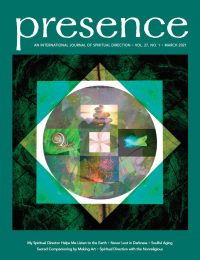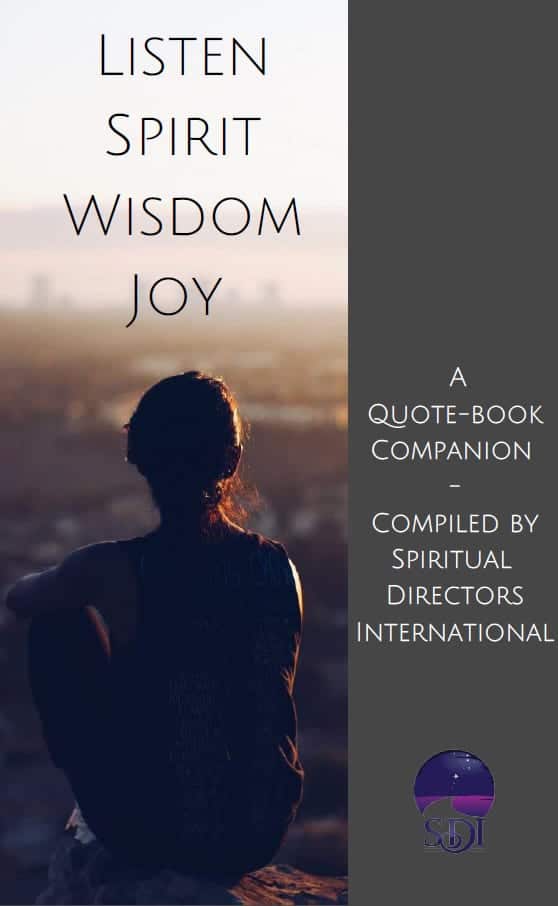Hineni: In Imitation of Abraham
by Alisa Kasmir (Reviewed by Pegge Erkeneff)
Collegeville, MN: Liturgical Press, 2020
125 pages
CAD $9.99, GBP £7.32, USD $16.95
 Hineni: In Imitation of Abraham is a surprise. I am not sure I would have found this book if it had not found me. My extensive library of thousands of books contains classics and hundreds of titles on prayer, spiritual direction, and supervision from Eastern and Western spiritual traditions. Hineni belongs in a prominent spot about spiritual direction, in a time when there have been very few new books in recent years. Author Alisa Kasmir lives in Rotterdam, Netherlands, and together with her Labrador, Pippa, offers spiritual companioning with individuals, with groups, and at a senior rehabilitation center for people with dementia. She holds a degree in spiritual direction from the Titus Brandsma Instituut in Nijmegen.
Hineni: In Imitation of Abraham is a surprise. I am not sure I would have found this book if it had not found me. My extensive library of thousands of books contains classics and hundreds of titles on prayer, spiritual direction, and supervision from Eastern and Western spiritual traditions. Hineni belongs in a prominent spot about spiritual direction, in a time when there have been very few new books in recent years. Author Alisa Kasmir lives in Rotterdam, Netherlands, and together with her Labrador, Pippa, offers spiritual companioning with individuals, with groups, and at a senior rehabilitation center for people with dementia. She holds a degree in spiritual direction from the Titus Brandsma Instituut in Nijmegen.
Kasmir opens with a “Dear Reader” note and pens, “I hope that reading it [this book] will give you an idea of what it means to be present, in flesh and blood, to the mystery of another person, and about what it means to say, ‘Here I am for you, with you.’ Hineni is a way of seeing the world, of being in it and relating to it, and so, although this book applies theory specifically to the contemplative practice of spiritual direction, there is meaning to be found in these pages, whether you are involved in spiritual direction or not” (ix).
I read this book in small bites. The introduction articulates the gift of presence and accompaniment inherent in spiritual direction, and it provides a framework for the remainder of the book. I underlined many spots, finding a kindred spirit in Kasmir, with our mutual understanding. She writes, “The question at the heart of spiritual direction is how to meet the mystery of the other. Hineni is not an answer to the mystery. It is a response to the challenge, a response from the space where mystery and oneness meet. Hineni, ‘here I am,’ means much more than just showing up.… A spiritual director listens for the story behind their story—God’s story unfolding in them—and lifts it so that it can be seen and heard and made more visible to them.… It is true for people of faith and people who say they have none” (xvii–xviii).
The book was written in four chapters: “Genesis 22—A Midrash,” “Hineni: Making the Name and the Practice of Spiritual Direction,” “Collected Wisdom from the Field,” and the “Conclusion.” My theological mind and biblical studies background were delightfully stretched in the first section through textual analysis of Genesis 22. The notes section of the book is extensive and well done, and the bibliography provides familiar titles as well as previously unknown authors I will explore in future months.
A question is posed: “How do you have a relationship with your heart’s desire, when old, comforting images and illusions of God have fallen away and there is nothing to replace them, while at the same time it becomes clear that nothing but your heart’s desire will satisfy?” (28). For many, myself included, this is a lived experience that the author identifies as when “we have no idea what we have said ‘yes’ to” (27). Thus, “hineni” may be the only response: here I am. The remainder of the chapter helps break open an expanded understanding of Hineni, and it concludes by quoting Rabbi Norman J. Cohen, who wrote in his book Hineini in Our Lives that hineni is about “‘letting go of preconceived ideas and gently bringing ourselves into the presence of what is—not what we imagine or remember or desire. To be truly present requires conscious, sustained effort and attention, and a willingness to be authentic, awake, and attuned’” (136).
The third chapter will be a welcome read for spiritual directors, where “eight spiritual directors, representing over 250 years of experience” (42), share their wisdom of living hineni or presence. A rabbi, Dominican mystic, Benedictine nun, Protestant minister, professor and Benedictine oblate, Carmelite priest, Pippa the Labrador (through the author’s imagination), and Kasmir, who works with people experiencing dementia, each respond. Some readers may struggle to translate the language and lived experience of these spiritual directors who identify with a spiritual tradition. Yet, central to each is deep presence, a connection to the mystics, and deep respect for mystery of the other, and they embody a long, rich tradition of spiritual direction that weaves through centuries.
It has been a long time since I have read a book that taps and enhances the best of my own monastic and biblical history and lived experience beyond traditional definitions and borders. I recommend Hineni, together with inquiry into the invitation offered to the reader.
This Review Appears In
Reviewer
Pegge Erkeneff is an author, spiritual guide, and director of communications for a school district in Alaska, USA. She received her training in 1996 from the Formation Program for Spiritual Directors offered through the Center for Spirituality at Work in Denver, Colorado, USA, and she taught in the program for several years. She can be reached at [email protected].



